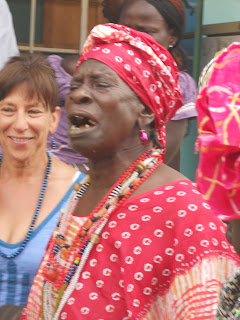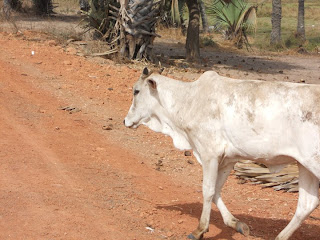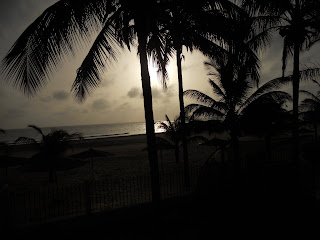

 from work, promising to return when it was time to go home. This week they have been SO happy to see me coming.
from work, promising to return when it was time to go home. This week they have been SO happy to see me coming. A little adventure through West Africa during my internship with the UN World Food Programme in the Gambia.


 from work, promising to return when it was time to go home. This week they have been SO happy to see me coming.
from work, promising to return when it was time to go home. This week they have been SO happy to see me coming. 

 Sometimes I catch myself watching the people and things around me like I'm in some kind of wonderful dream. I see the things around me like the opening scene of a movie where they show shot after shot of whatever beautiful and exotic place it was filmed at, where even the smallest task looks beautiful and intriguing. It catches me in the most unexpected moments: walking through a crowded market with colorful fabrics and foreign foods; seeing a child carry giant loads of water on top of her head, walking tenderly so not to get her gorgeous African dress muddy; watching mensit in circles discussing the Quran and making pot after pot of excessively sweet tea over an open fire; hearing hundreds of brightly dressed women, with babies strapped on their backs, chatting as they wait for hours on end to see a doctor; waking up to the beautiful call of a long-tailed, royal blue bird; catching the sharp aroma of dozens of flowering trees. Sometimes I catch myself observing these things as if I weren't a participant, as if I were some far away observer seeing how beautiful life is here. When I catch myself, I get a stupid, silly grin and can't help but can't help but think how incredibly fortunate I am to be able to experience this. As with everything that is good, or brings us joy, I so wish that I could
Sometimes I catch myself watching the people and things around me like I'm in some kind of wonderful dream. I see the things around me like the opening scene of a movie where they show shot after shot of whatever beautiful and exotic place it was filmed at, where even the smallest task looks beautiful and intriguing. It catches me in the most unexpected moments: walking through a crowded market with colorful fabrics and foreign foods; seeing a child carry giant loads of water on top of her head, walking tenderly so not to get her gorgeous African dress muddy; watching mensit in circles discussing the Quran and making pot after pot of excessively sweet tea over an open fire; hearing hundreds of brightly dressed women, with babies strapped on their backs, chatting as they wait for hours on end to see a doctor; waking up to the beautiful call of a long-tailed, royal blue bird; catching the sharp aroma of dozens of flowering trees. Sometimes I catch myself observing these things as if I weren't a participant, as if I were some far away observer seeing how beautiful life is here. When I catch myself, I get a stupid, silly grin and can't help but can't help but think how incredibly fortunate I am to be able to experience this. As with everything that is good, or brings us joy, I so wish that I could Yesterday I went to Banjul, Gambia's capital for the first time. I was expecting lots of big buildings, wide roads and lots of government officials out and about on the swampy island, but I was sorely mistaken. Banjul is a small island formed by the Atlantic Ocean and the Gambian river. It holds significant importance in the formation of the Gambia because in the British fight against France for the area that makes up Senegal and Gambia, the British were able to hold Banjul and the Gambian river. The British were trying to enforce abolition of slavery, while the French still were trying to use this influential river to get slaves for their colonies. The British won, but there are still several tourist sites where one can see where slaves were sold and shipped to the Americas. This gives Gambia its odd geography as a country surrounded by Senegal on all sides.
Yesterday I went to Banjul, Gambia's capital for the first time. I was expecting lots of big buildings, wide roads and lots of government officials out and about on the swampy island, but I was sorely mistaken. Banjul is a small island formed by the Atlantic Ocean and the Gambian river. It holds significant importance in the formation of the Gambia because in the British fight against France for the area that makes up Senegal and Gambia, the British were able to hold Banjul and the Gambian river. The British were trying to enforce abolition of slavery, while the French still were trying to use this influential river to get slaves for their colonies. The British won, but there are still several tourist sites where one can see where slaves were sold and shipped to the Americas. This gives Gambia its odd geography as a country surrounded by Senegal on all sides. There are a couple of large parks, which can be hard to find in other parts of the country. The nation's only tertiary hospital is located in Banjul. My good friend, Mafo, is finishing up med school and spends most of her time there, so we went for a tour of the hospital. Every ward is sponsored by a different organization (e.g. Shell) and you can easily tell which wards are well funded, and which ones are struggling. The security guide took as all over the hospital trying to find the official tour guide, but by the time we actually found him, we had already seen the whole thing and just asked the tour guide a few extra questions. At the hospital I've been volunteering at we send a lot of patients to this hospital. They had a little bit more equipment, but in general it wasn't that much different, just bigger.
There are a couple of large parks, which can be hard to find in other parts of the country. The nation's only tertiary hospital is located in Banjul. My good friend, Mafo, is finishing up med school and spends most of her time there, so we went for a tour of the hospital. Every ward is sponsored by a different organization (e.g. Shell) and you can easily tell which wards are well funded, and which ones are struggling. The security guide took as all over the hospital trying to find the official tour guide, but by the time we actually found him, we had already seen the whole thing and just asked the tour guide a few extra questions. At the hospital I've been volunteering at we send a lot of patients to this hospital. They had a little bit more equipment, but in general it wasn't that much different, just bigger.  national museum, which was incredibly interesting. They had all kinds of artifacts from Miss Gambia 1985's gown to burial treasures from 10,000BC. Humanity began in Africa (the Garden of Eden is largely thought to have been in Ethiopia or Sudan), our first major civilizations were here, and it holds such a rich history that its impossible to think of all the contributions to the modern world that Africa has made. This small museum was rich with artifacts dating back to our earliest forefathers, like the club shown above, and some of the earliest iron tools that were made. I also really enjoyed reading about colonialism, the fight for independence and how political history has shaped this area. My favorite things to learn about were the masquerades that are still practiced here, in which men dress up in a variety of scary costumes, carry machetes and scare away evil spirits. Most people hide inside while these are going on. Here is a photograph of a Simba, or lion, masquerade. The museum also had a variety of incredible drums, the earliest xylophones and early guitars and banjos ("banjo" is actually an African word!)
national museum, which was incredibly interesting. They had all kinds of artifacts from Miss Gambia 1985's gown to burial treasures from 10,000BC. Humanity began in Africa (the Garden of Eden is largely thought to have been in Ethiopia or Sudan), our first major civilizations were here, and it holds such a rich history that its impossible to think of all the contributions to the modern world that Africa has made. This small museum was rich with artifacts dating back to our earliest forefathers, like the club shown above, and some of the earliest iron tools that were made. I also really enjoyed reading about colonialism, the fight for independence and how political history has shaped this area. My favorite things to learn about were the masquerades that are still practiced here, in which men dress up in a variety of scary costumes, carry machetes and scare away evil spirits. Most people hide inside while these are going on. Here is a photograph of a Simba, or lion, masquerade. The museum also had a variety of incredible drums, the earliest xylophones and early guitars and banjos ("banjo" is actually an African word!)  Yesterday I went to a true African wedding. My friends, Lucy and Okwin, have some friends in town that are teachers in New Mexico and have a house here as well as a family that they have "adopted." Judy and Valentine are in town to celebrate their God-daughter's wedding and graciously invited us along. I have never been to anything like it and I only stayed for the beginning of the festivities! Bento, the bride married her cousin, an arranged marriage, which is common practice in their household. The first part of the wedding, the part I attended, was held at the bride's family's compound which houses around 40 people from 3 generations: grandparents, 9 siblings, their spouses and children. The house was one long corridor of rooms with doors facing to the outside, like a motel, and a common living space, bathroom and kitchen outside. All of the rooms could easily fit inside my parent's house and the lot could probably fit into their backyard, so you can imagine how crowded the compound is everyday. Today everyone was outside in the most beautiful clothes, cooking for everyone and enjoying the festivities.
Yesterday I went to a true African wedding. My friends, Lucy and Okwin, have some friends in town that are teachers in New Mexico and have a house here as well as a family that they have "adopted." Judy and Valentine are in town to celebrate their God-daughter's wedding and graciously invited us along. I have never been to anything like it and I only stayed for the beginning of the festivities! Bento, the bride married her cousin, an arranged marriage, which is common practice in their household. The first part of the wedding, the part I attended, was held at the bride's family's compound which houses around 40 people from 3 generations: grandparents, 9 siblings, their spouses and children. The house was one long corridor of rooms with doors facing to the outside, like a motel, and a common living space, bathroom and kitchen outside. All of the rooms could easily fit inside my parent's house and the lot could probably fit into their backyard, so you can imagine how crowded the compound is everyday. Today everyone was outside in the most beautiful clothes, cooking for everyone and enjoying the festivities. d moved their arms and bodies in ways that are difficult to describe. It was an invigorating and exciting dance and they would literally push each other out of the way to dance. I don't think they minded being pushed out of the circle through, it was so hot and the most energy-sapping dances, it was almost like they were getting "tagged out of the ring" like they do in those fake wrestling matches. They danced for about 2 hours and then lunch was served.
d moved their arms and bodies in ways that are difficult to describe. It was an invigorating and exciting dance and they would literally push each other out of the way to dance. I don't think they minded being pushed out of the circle through, it was so hot and the most energy-sapping dances, it was almost like they were getting "tagged out of the ring" like they do in those fake wrestling matches. They danced for about 2 hours and then lunch was served. Yesterday was my last day with the UN World Food Programme. I have mixed feelings about my time there, but I am so happy that I had the opportunity. I was in the programming division, that primarily focused on providing school lunches to about 500 schools nationwide (almost every school). The main problem I had with WFP is that I didn't have a clear role so it was difficult to fill my days with any kind of meaningful work. Sometimes I was asked to do a task and when it was complete my supervisor didn't want it anymore or had changed his mind. So I designed several national studies, analyzed quite a bit of data, wrote several national reports and presentations that may be used in the future, but right now are just sitting in my supervisor's e-mail box. I also expected to be much more hands on, in the field and with the schools and I wasn't given that opportunity so that was very disappointing.
Yesterday was my last day with the UN World Food Programme. I have mixed feelings about my time there, but I am so happy that I had the opportunity. I was in the programming division, that primarily focused on providing school lunches to about 500 schools nationwide (almost every school). The main problem I had with WFP is that I didn't have a clear role so it was difficult to fill my days with any kind of meaningful work. Sometimes I was asked to do a task and when it was complete my supervisor didn't want it anymore or had changed his mind. So I designed several national studies, analyzed quite a bit of data, wrote several national reports and presentations that may be used in the future, but right now are just sitting in my supervisor's e-mail box. I also expected to be much more hands on, in the field and with the schools and I wasn't given that opportunity so that was very disappointing.




 the United States, but that has been astronomical to so many other countries, and Gambia is certainly not excluded.
the United States, but that has been astronomical to so many other countries, and Gambia is certainly not excluded.
Anyway, those are just small day to day things that are just different from home and need some getting used to. Have a great day!


 There are also lot of farm animals everywhere. Cows roaming the streets, goats meandering through markets and chickens looking for food in restraunts. There are some garbage trucks here (I've seen one in the resort areas) but most people throw their trash in a large heap and burn it every once in a while. The animals dig through the piles finding the tastiest treats. It sounds like a great plan but the animals tend to find things that can make them sick, kill them or contaminate their milk and meat that people eat. They also leave little messes behind so you have to watch where you step. There was a public health study in Peru a few years ago that had one village put their animals in fences or cages and one village let their animals roam as usual. It was astounding how much desiese dropped when the animals weren't out, especially among young children who have a tendency to put everything in their mouths!
There are also lot of farm animals everywhere. Cows roaming the streets, goats meandering through markets and chickens looking for food in restraunts. There are some garbage trucks here (I've seen one in the resort areas) but most people throw their trash in a large heap and burn it every once in a while. The animals dig through the piles finding the tastiest treats. It sounds like a great plan but the animals tend to find things that can make them sick, kill them or contaminate their milk and meat that people eat. They also leave little messes behind so you have to watch where you step. There was a public health study in Peru a few years ago that had one village put their animals in fences or cages and one village let their animals roam as usual. It was astounding how much desiese dropped when the animals weren't out, especially among young children who have a tendency to put everything in their mouths! monkeys gather breakfast on my way to work, a horse graze and check out a crocodile at lunch, and have been shooing a hen and her chicks while I've been writing this blog! I wouldn't call Gambia an "Animal Lover's Paradise"~ as most of the animals are mistreated. But it certainly is neat to see so much life all the time!
monkeys gather breakfast on my way to work, a horse graze and check out a crocodile at lunch, and have been shooing a hen and her chicks while I've been writing this blog! I wouldn't call Gambia an "Animal Lover's Paradise"~ as most of the animals are mistreated. But it certainly is neat to see so much life all the time!In some ways, daily life in Africa is the same as the good ole US of A. I get up every morning, head to work, eat out for lunch, and look at Facebook everyday. But a lot of things are taking some getting used to. For example, I will forevermore be infinitely more grateful for washing machines. To wash clothes here you must:
Something else I'm not yet used to is not having power. Rainy season started last week and we only get a couple of hours of power a day. There is no air conditioning, but no power means no fans, no water, no refrigerator, no lights, no internet. In short, if you have a flashlight you can read or play games (we play a lot of cards!) I didn't take a shower for 3 days simply because we didn't have water. Last night, I FINALLY got a cold shower! If you want a hot shower, you have to ask the man at the compound to turn on the hot water, but he had already left when the power came back on last night. With the power shortage, it is also becoming more difficult to find things to eat. I'm weary to eat meat if it has not been refigerated properly so I'm quickly becoming a vegetarian. It sounds terrible, but everyone here is so used to it, it doesn't seem like a problem at all. I'm worried about when the rains REALLY come and we can't sit outside anymore and we can't keep the windows open for the breeze. Everyone spends so much time outside here, I think it will be really oppressive. We'll see!
Another thing that I'm still getting used to is depending on public transport to get everywhere. I've never depended so heavily on strangers to get me to where I need to be and always needing cash to get around. There are 3 types of taxis here. Green taxis are tourist taxis and charge about 400D ($16), yellow and green taxis are town taxis that take you by yourself anywhere you want for 25-100D ($1-$4) and yellow and green taxis with a taxi sign on top are taxis with little routes and carry lots of people at a time for 7D (28 cents). If you take those taxis you may have to take several to get where you want. But I can take one to work. Its taken me a long time to tell the diffence between a town taxi and a taxi for 7D, but now I think I got it down.
In other news, I got a kitten this weekend that is absolutely wonderful! The ticket guy at the soccer game let me hold her and then told me to keep her. So I did! She looks about 1 month old and is still drinking milk, but she is very playful and sweet. Everyone loves her!
Work has gotten much better. I have lots of projects to keep me busy. Most of them are research studies and I probably cannot leave the office for liability reasons. So I'm just looking at a lot of data all day. Its not exactly what I had in mind, but I may look for other volunteer opportunities to do when I'm not working.
I'm trying to upload pictures everyday to Facebook. Feel free to check it out! Thats all. Have a wonderful day and enjoy your electricity!!

 called Monkey Park. There were the cutest monkeys everywhere! They are used to humans so they would come right up to us and just stare at us, presumably wanting food. We met up with some girls that I met last night and had lunch with them. I meant to go home and give my apartment a good cleaning, but to my suprise I have a maid! She came to clean up so I got to come work on my blog! In a little bit I'm going to a national soccer game and then to a game night that all the workers from other countries (expats) go to.
called Monkey Park. There were the cutest monkeys everywhere! They are used to humans so they would come right up to us and just stare at us, presumably wanting food. We met up with some girls that I met last night and had lunch with them. I meant to go home and give my apartment a good cleaning, but to my suprise I have a maid! She came to clean up so I got to come work on my blog! In a little bit I'm going to a national soccer game and then to a game night that all the workers from other countries (expats) go to. I love my new apartment. But more than that I love the community of it. It sits on the end of a dirt road, about 3 blocks from the main raod. It's a white and green compound with 9 apartments, 7 of which are occupied by the most wonderfully interesting and kind people. The compound is full of beautiful trees, flowers and exotic birds. From the 4th floor you can look over the treetops and see into the town or out to the ocean.
I love my new apartment. But more than that I love the community of it. It sits on the end of a dirt road, about 3 blocks from the main raod. It's a white and green compound with 9 apartments, 7 of which are occupied by the most wonderfully interesting and kind people. The compound is full of beautiful trees, flowers and exotic birds. From the 4th floor you can look over the treetops and see into the town or out to the ocean. 
